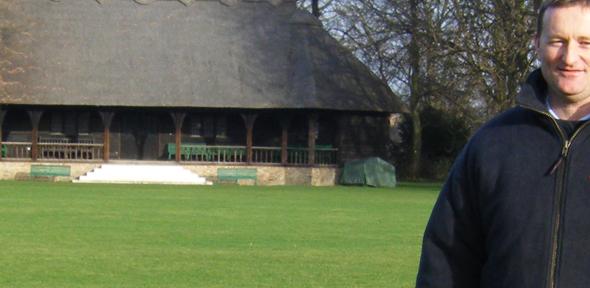
As Head Groundsman of Jesus College, Allan Moore is responsible for the care of nearly 12 acres of sports grounds
Keeping Jesus green
Allan Moore dresses for work in a charcoal fleece with “Jesus College Groundsman” embroidered in two lines over his heart, and clean jeans and mud splattered work boots. On this day in January, the weather is windy and damp, but the cold isn’t as biting as it was in December.
“This is the kind of job that everyone wants to have in the summer, but there’s not the same enthusiasm for it in the winter,” he says, while showing a visitor the College’s sports grounds.
He stops walking on the edge of the cricket pitch, near where it meets the rugby pitch, and lets his gaze take in the full view. From here, he can see the entire back stretch of Jesus’ red brick architecture, an array of gables and towers, as well as the woods on the opposite side of the fields. “You can see the chapel and the old College buildings, the trees all around, and the thatched pavilion,” he says, a note of satisfaction evident in his voice. “Personally, I think there’s no better setting in Cambridge for a cricket pitch.”
For seven years, Allan has been charged with the maintenance of the Jesus College sports grounds, which unlike nearly all other Cambridge colleges, are located within the College’s boundaries. These 12 acres – comprising a rugby pitch, football pitch, cricket pitch, two grass tennis courts and three hard tennis courts – are his workplace. He estimates he spends roughly six hours of the day outside, ensuring that the grounds are in good condition for the College’s student athletes.
It is a solitary role. The College employs six gardeners, and Allan can draw on their assistance if needed, but responsibility for the sports fields falls solely on his shoulders. “It can be lonely sometimes,” he admits. “Sometimes I wish I had someone to work alongside me, but other times it’s good. I have my coffee break and my lunch break with the other gardeners. It’s not like I’m stranded out there all day.”
The seasons dictate his duties. Towards the end of Lent Term, the football and rugby pitches will go out of use for their intended sports, although they are still used for other activities out of season. He’ll begin preparing the cricket pitch and its outfield as well as the tennis courts. To get them ready involves watering, rolling, verti-cutting, feeding, marking out and cutting the grass. In verti-cutting, the blades are positioned vertically and set just above ground level to remove surface debris, bits of dead grass and horizontal grass growth. “Organic matter on the surface acts as a sponge and affects ball bounce, so it’s important to keep it clean” he says.
At the end of the season, the grass is cut off the cricket square and all the organic material is removed from the surface and the upper 5 to 10 millimetres of the soil using a scarifying machine. “After that, we put seed on and a top dressing of clay loam. It’s the same process on the tennis courts,” he says. Then, the rugby and football goal posts go back up and Allan, using a battery-powered spray line marker, measures and marks out the rugby and football pitches.
Throughout the autumn months, his main work consists of cutting, marking out and aerating the grass, using a machine that creates holes in the ground to let air and water in. He also clears leaves and conkers, which drop from the College’s many chestnut trees. No matter what the time of year, regular maintenance is key.
Bad weather can be a problem, but it gives him a chance to do maintenance on his machinery. He also is the manager of the schedule for use of the sports grounds, so from his office in the college’s Gardening and Maintenance Building he can respond to student emails requesting pitch time.
He’s happiest, though, when he’s out in the fresh air. “It’s nice to be outside rather than stuck inside an office,” he says. Producing a first-rate pitch is gratifying. He doesn’t know many of the students who use the grounds, but he hopes they enjoy the fruits of his labour. “If people are happy playing on them, that’s good.”
